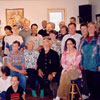Edmonton Estonian Society
 Edmontonians of Estonian descent trace their roots to two distinctly different environments. The first group consists of second- and even third-generation Estonians who moved away from their farms and gravitated towards Alberta's urban centers in an effort to pursue post-secondary studies and, eventually, find suitable employment. The other group is comprised of World War II Estonian refugees desperately trying to escape Russian occupation of Estonia and Siberia's gulags during a period of grave violence and uncertainty. Soviet officials viewed Estonians who fled their country during World War II as traitors; for their treason, these so-called Estonian traitors were subject to work in labour camps in Siberia upon their return to Russian soil. Many of Alberta's newcomers had a contact here, typically a friend or relative. Families wishing to emigrate had to seek out sponsorships from Canada, often a difficult and arduous process.
Edmontonians of Estonian descent trace their roots to two distinctly different environments. The first group consists of second- and even third-generation Estonians who moved away from their farms and gravitated towards Alberta's urban centers in an effort to pursue post-secondary studies and, eventually, find suitable employment. The other group is comprised of World War II Estonian refugees desperately trying to escape Russian occupation of Estonia and Siberia's gulags during a period of grave violence and uncertainty. Soviet officials viewed Estonians who fled their country during World War II as traitors; for their treason, these so-called Estonian traitors were subject to work in labour camps in Siberia upon their return to Russian soil. Many of Alberta's newcomers had a contact here, typically a friend or relative. Families wishing to emigrate had to seek out sponsorships from Canada, often a difficult and arduous process.
The first World War II Estonian refugee to arrive was Mari Sörra, who married a French-Canadian from Edmonton. Mari Sörra-Pelletier and her husband ventured into Edmonton's restaurant business, purchasing the "Four Aces" restaurant in the city centre. The restaurant flourished under their management. Mari went on to become one of the Edmonton Estonian Society's founding members and served on its executive committee. Estonians eager to begin a new life in a new country soon followed in her footsteps. Many of the Estonians who arrived in Edmonton were skilled professionals, including architects and agricultural experts. Members of Alberta's original Estonian homesteading societies, such as Edward Moro and Robert Kinna, were already living in Edmonton and were happy to accommodate their long-lost friends or relatives.








